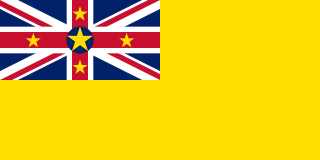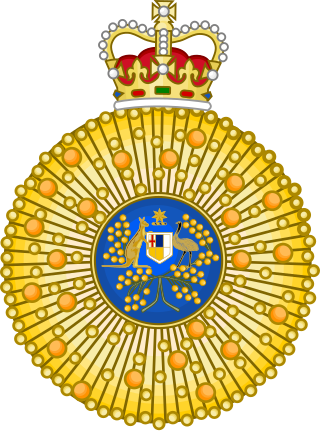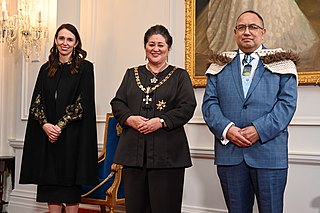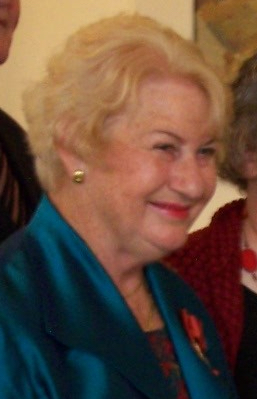
Michael Kenneth Moore was a New Zealand politician, union organiser, and author. In the Fourth Labour Government he served in several portfolios including minister of foreign affairs, and was the 34th prime minister of New Zealand for 59 days before the 1990 general election elected a new parliament. Following Labour's defeat in that election, Moore served as Leader of the Opposition until the 1993 election, after which Helen Clark successfully challenged him for the Labour Party leadership.

Niue is a self-governing island country in free association with New Zealand. It is situated in the South Pacific Ocean and is part of Polynesia, and predominantly inhabited by Polynesians. The island is commonly referred to as "The Rock", which comes from the traditional name "Rock of Polynesia".

The Order of Australia is an Australian honour that recognises Australian citizens and other persons for outstanding achievement and service. It was established on 14 February 1975 by Elizabeth II, Queen of Australia, on the advice of then prime minister Gough Whitlam. Before the establishment of the order, Australians could receive British honours, which continued to be issued in parallel until 1992.

The flag of New Zealand, also known as the New Zealand Ensign, is based on the British maritime Blue Ensign – a blue field with the Union Jack in the canton or upper hoist corner – augmented or defaced with four red stars centred within four white stars, representing the Southern Cross constellation.

The New Zealand royal honours system, a system of orders, decorations and medals, recognises achievements of, or service by, New Zealanders or others in connection with New Zealand. Until 1975, New Zealand used the British honours system. Since then the country has introduced a number of uniquely New Zealand honours, and as of 2021, only the dynastic British honours continue in active use in New Zealand, with the exception of the Order of the Companions of Honour.

The New Zealand Order of Merit is an order of merit in the New Zealand royal honours system. It was established by royal warrant on 30 May 1996 by Elizabeth II, Queen of New Zealand, "for those persons who in any field of endeavour, have rendered meritorious service to the Crown and nation or who have become distinguished by their eminence, talents, contributions or other merits", to recognise outstanding service to the Crown and people of New Zealand in a civil or military capacity.

Dame Annette Faye King is a former New Zealand politician. She served as Deputy Leader of the New Zealand Labour Party and Deputy Leader of the Opposition from 2008 to 2011, and from 2014 until 1 March 2017. She was a Cabinet Minister in the Fourth and Fifth Labour Governments, and was the MP for the Rongotai electorate in Wellington from 1996 to 2017.

The Order of precedence in New Zealand is a guide to the relative seniority of constitutional office holders and certain others, to be followed, as appropriate at State and official functions. The previous order of precedence was revoked and Queen Elizabeth II approved the following Order of Precedence in New Zealand effective 20 September 2018:
- The Monarch of New Zealand.
- The Governor-General or, while acting in the place of the Governor-General, the officer administering the Government
- The Prime Minister
- The Speaker of the House of Representatives
- The Chief Justice
- The Dean of the Diplomatic Corps
- The Deputy Prime Minister
- Ministers of the Crown
- Former Governors-General
- Ambassadors and High Commissioners in New Zealand and Chargés d’Affaires accredited to New Zealand.
- The Leader of the Opposition in the House of Representatives
- Leaders, including co-leaders and joint leaders, of political parties represented in the House of Representatives, other than Ministers of the Crown.
- Members of the House of Representatives. There is no established order of precedence over members of parliament in general, although each party has its internal ranking.
- Judges of the Supreme Court of New Zealand, the Court of Appeal and the High Court of New Zealand.
- Former Prime Ministers, former Speakers of the House of Representatives, former Chief Justices, and members of the Privy Council.
- Mayors of territorial authorities and chairpersons of regional councils, while in their own cities, districts and regions. In 1989, boroughs and counties were amalgamated into district councils. District mayors, and the Chatham Islands mayor could expect to be accorded this same precedence.
- The Public Service Commissioner, Chief of Defence Force, Commissioner of Police, and Officers of Parliament .
- The Solicitor-General, Clerk of the House of Representatives, and Clerk of the Executive Council when attending a function involving the exercise of the position’s specific responsibilities.
- Chief executives of public service and non-public service departments.
- The Vice Chief of Defence Force, and Chiefs of Navy, Army and Air Force, and other statutory office holders.
- Consuls-General and Consuls of countries without diplomatic representation in New Zealand.
- Members of New Zealand and British orders, and holders of decorations and medals in accordance with the Order of Wear in New Zealand.

Sir John Phillip Key is a New Zealand retired politician who served as the 38th prime minister of New Zealand from 2008 to 2016 and as leader of the New Zealand National Party from 2006 to 2016.

Maurice Donald Williamson is a New Zealand politician and former diplomat.

Murray John Finlay Luxton was a New Zealand National Party politician, serving as a Member of Parliament from 1987 to 2002. From 2008 to 2015, he was the Chairman of DairyNZ, the organisation that represents all New Zealand dairy farmers. He was co-chair of the Waikato River Authority, a Crown/iwi co-governance organisation established through Treaty of Waitangi settlement legislation to clean up the Waikato River.

Sir Stephen Robert Tindall is the founder of New Zealand retailer The Warehouse, The Warehouse Group, and the Tindall Foundation.
The Department of the Prime Minister and Cabinet is the central public service department of New Zealand, charged with providing support and advice to the governor-general, the prime minister and members of the Cabinet of New Zealand. The department is also charged with centrally leading New Zealand's "national security planning, which includes civil defence." The department's overall area of responsibility is in helping to provide, at an administrative level, the "constitutional and institutional glue" within New Zealand's parliamentary democracy. The department along with the Public Service Commission, and the Treasury constitute the central agencies or public service departments leading the state sector of New Zealand.

Alexander Robert McLean is a former New Zealand rower who won an Olympic bronze medal.

Dame Margaret Kerslake Shields was a New Zealand politician of the Labour Party. She had three terms in the House of Representatives in the 1980s and was afterwards a member of the Greater Wellington Regional Council, including as chairman.

Timothy Harley Macindoe is a New Zealand politician who has served as a member of the Hamilton City Council for the East Ward since 2024. Macindoe was previously a Member of Parliament for the Hamilton West electorate from 2008 to 2020. He served as the Minister of Customs for the final six months of the Fifth National Government.

Helen Elizabeth Clark is a New Zealand politician who served as the 37th prime minister of New Zealand from 1999 to 2008, and was the administrator of the United Nations Development Programme from 2009 to 2017. She was New Zealand's fifth-longest-serving prime minister, and the second woman to hold that office.

Sir Peter David Gluckman is a New Zealand scientist. Originally trained as a paediatrician, he served as the inaugural Chief Science Advisor to the New Zealand Prime Minister from 2009 to 2018. He is a founding member and was inaugural chair of the International Network for Government Science Advice, and is president of the International Science Council.

Martyn John Dunne, is a retired New Zealand Army officer, a diplomat and senior public servant. He was the chief executive of the Ministry for Primary Industries. From 2011 until 2013 he was New Zealand High Commissioner to Australia based in Canberra. He was Comptroller of Customs and Chief Executive of the New Zealand Customs Service (2004–2011) after a career as soldier in the New Zealand Army from 1970 ending his military career in 2004 as Commander Joint Forces New Zealand with the rank of major general. In September 1999, Dunne led the New Zealand Force East Timor during New Zealand's largest deployment since World War II, and as the Senior National Officer and, with the rank of brigadier, commanded the Dili Command, an operational formation in the International Force East Timor, until 2000.

Kristopher John Faafoi is a former New Zealand television journalist and Labour Party politician. He was the Member of Parliament for the Mana electorate from 2010 until 2020, when he became a list MP. Faafoi held a number of ministerial portfolios in the Sixth Labour Government from 2017, including Minister of Justice, Minister of Broadcasting and Media, and Minister of Immigration. He retired from politics in June 2022.


















